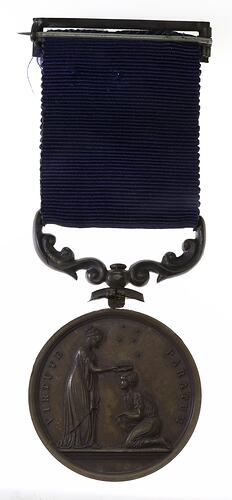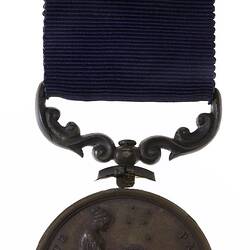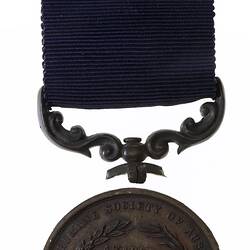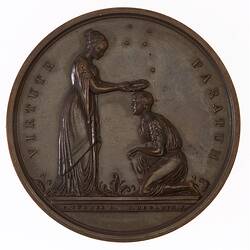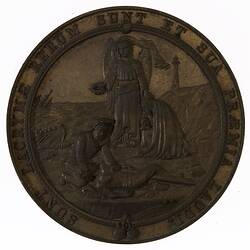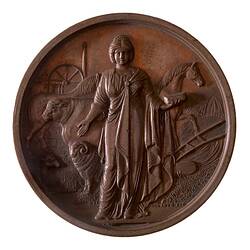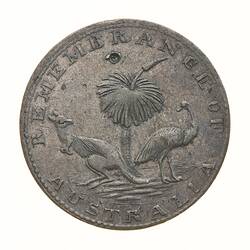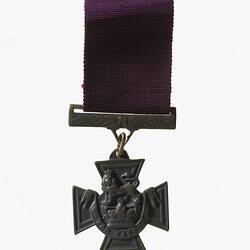Summary
Bronze Medal awarded to Lewis Martin by the Royal Humane Society of Australasia for his act of bravery on 3 August 1891 (case number 1106). Lewis Martin a 44-year-old fish salesman 'who had recently come to the [Bacchus Marsh] district'. He and Thomas Anderson used a punt to try to rescue Lucius Herbert Marston and Albert Ernest Abud, who were clinging to a fence in floodwaters. A third man, Henry Biggs, a 25-year-old brickmaker who had recently married, had already drowned. The men clinging to a fence had themselves tried to undertake a rescue of a man who was endangered by floodwaters, at the request of local Police Constable David McGrath. Martin and Anderson's punt capsized, and they were fortunate to escape drowning. The men clinging to the fence were eventually rescued by other bystanders. Martin, Anderson, Marston and Abud all received bronze medals from the Royal Humane Society of Australasia.
Physical Description
An mounted (althouth the mount and ribbon have come off the medal) and issued bronze prize medal of the Society (39 mm diameter with purple ribbon) It features a female placing a wreath on the head of a kneeling male beneath the Southern Cross and provides the name of the winner, Lewis Martin and the date 3rd Aug. 1891 on the reverse within a wreath. This medal does not have the usual artist's names nor plants, it appears to be from replacement for the original die.
Obverse Description
Woman in Ancient Greek clothing standing at left placing wreath on head of young man kneeling at right below Southern Cross; around, VIRTUTE PARATUM
Reverse Description
At centre within olive wreath AWARDED / TO / Lewis Martin / 3rd Augt./ 1891; around, ROYAL HUMANE SOCIETY OF AUSTRALASIA INSTD. A.D. 1874 (the name of recipient and date are engraved)
Edge Description
Plain
Significance
Lewis Martin performed an act of bravery during floods at Bacchus Marsh on 3 August 1891. That day, the Bacchus Marsh Express recorded, was 'memorable in the history of Bacchus Marsh as the date of the biggest flood seen in the valley by white men'. The Lerderderg River was overflowing with fast-flowing water, and broke its banks at several places, including a break near the pound at Darley. The water rushed towards Fiskin Street, and from the break of day families in Fiskin Street began to flee. One couple, the Hinchcliffes, were encouraged to leave but Mr Hinchcliffe decided to remain at home. Local Constable David McGrath was concerned about his safety, and when storekeeper Lucius Herbert Marston drove by with a horse and heavy waggon, intending to collect furniture. McGrath asked him to save Hinchcliffe. Marston was accompanied by his assistant, Albert Ernest Abud, and driver Henry Biggs, a 25-year-old brickmaker who had recently married. McGrath explained that he had recently crossed the water safely on his horse. Marston and his team hurried to the water, and attempted the same crossing.
The strenth of the current swept the horse and waggon completely under, and Biggs was swept away and drowned in view of his wife. Marston and Abus managed to grab onto a fence, on the edge of a brick hole that threatened to collapse at any time. They clung on desparately as the water roared by and Biggs' wife screamed for him from the bank. Other bystanders, Thomas Anderson and 'a fish salesman named Martin, who had recently come to the district', grabbed a punt that was kept by the Water Supply Department to guage the height of the Werribee. Taking the most dangerous but shortest route to Marston and Abud, the punt quickly capsized, and Anderson and Martin were thrown into the water. Martin was a strong swimmer and was able to swim against the current, but Anderson struggled desparately before reaching safety. By now hundreds of onlookers had gathered, and two more people, Edward Simpson and Jack Wells, became involved in the rescue. They managed to lead Marston and Abud to safety via a longer route to their rear. A magisterial enquiry was held the following day and a verdict of 'accidentally drowned' was returned.
Martin, Anderson, Marston and Abud all received bronze medals from the Royal Humane Society of Australasia (Martin was case #1106; the others were 1102, 1103 and 1105). -Bacchus Marsh Express, 8 August 1891; Royal Humane Society of Australasia Annual Report 1892, p.36. -D. Tout-Smith 20/11/2003.
The Royal Humane Society of Australasia was founded in 1874 as the Victorian Humane Society. In 1882 it became 'The Royal Humane Society of Australasia', the first federal institution in Australia. The first object of the Society was to bestow award upon people who risked their lives to save others; the second object was to assist receipients who were disadvanted or disabled as a result of their brave actions, or to assist their surviving dependents. Initially the Society also arranged swimming and lifesaving training, but other organisations later took over this role. For many years the Society was located in the Old Customs House, Flinders Street.
More Information
-
Collection Names
-
Collecting Areas
-
Acquisition Information
Transfer from National Gallery of Victoria (NGV), George H. Wannenmacher, 15 Mar 1976
-
Date Issued
1891 AD
-
Issued By
-
Artist
-
Artist
-
Awarded To
-
Place & Date of Event
-
Inscriptions
Woman in Ancient Greek clothing standing at left placing wreath on head of young man kneeling at right below Southern Cross; around, VIRTUTE PARATUM (obverse) At centre within olive wreath AWARDED / TO / Lewis Martin / 3rd Augt./ 1891; around, ROYAL HUMANE SOCIETY OF AUSTRALASIA INSTD. A.D. 1874 (the name of recipient and date are engraved)(reverse)
-
Series
-
Material
Bronze
-
Axis
12
-
Classification
-
Category
-
Discipline
-
Type of item
-
Dimensions
97 mm (Height), 38 mm (Outside Diameter)
-
Shape
Round
-
References
[Book] Bannister, Colin. 1996. Seven Thousand Brave Australians: a History of the Royal Humane Society of Australasia 1874-1994.
[Article] Faringdon-Davis, John. 1984. The Royal Humane Society. Australian Numismatist. 5 (August): 2-15.
-
Keywords
